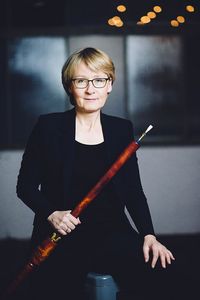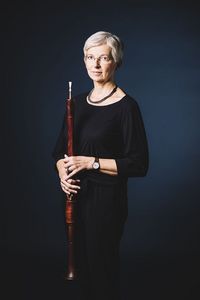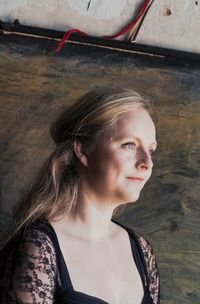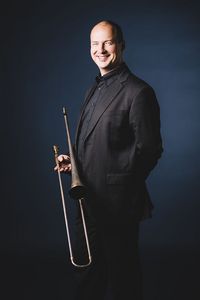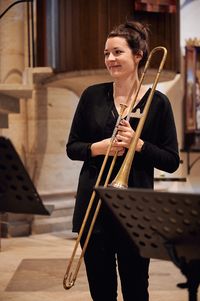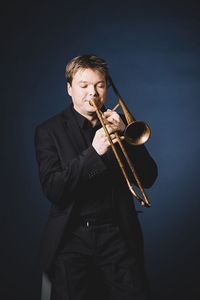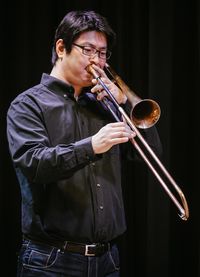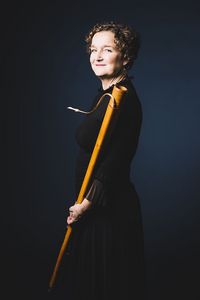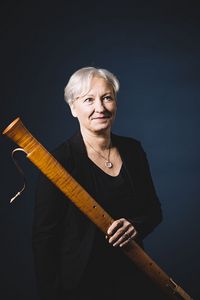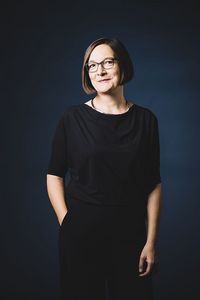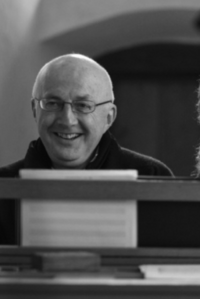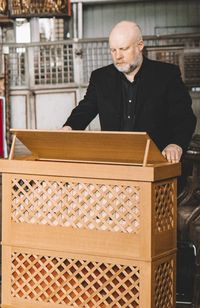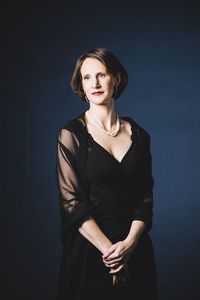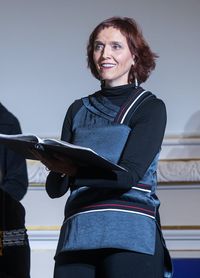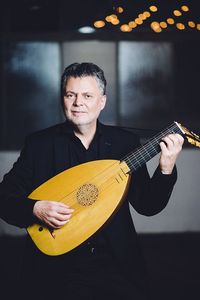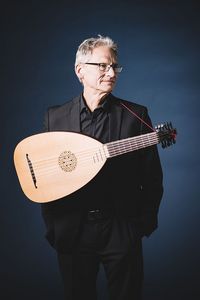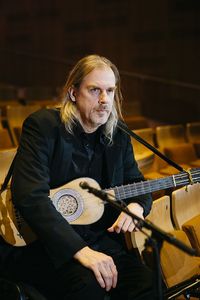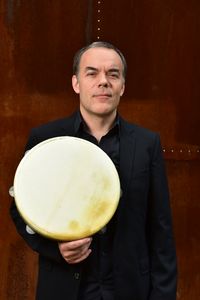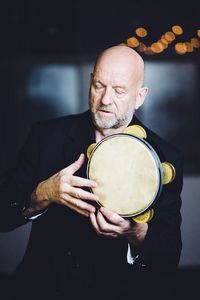Hildegard Wippermann
Hildegard Wippermann, born in Duisburg in 1963, studied recorder there with Gudrun Heyens. After successfully completing her Music Pedagogy Exam she continued to study with Manfredo Zimmermann at the Conservatory in Wuppertal where she acquired her Performing Artist Diploma. She gathered further inspiration from Han Tol at the Academy for Early Music, Bremen where she also began to study Renaissance reed instruments with Bernhard Junghänel. It was then that she started playing concerts all over Germany with the newly formed ensemble “Capella nova." In addition to working as a soloist, she developed her chamber music skills by participating in various projects for ensembles such as Weser Renaissance, the Freiburger Barockorchester, and the Bayerischer Staatsoper, and took part in many of their CDs and radio productions.
Birgit Bahr
Birgit Bahr studied recorder and early wind instruments with Prof. H. Weber and baroque oboe with R. Hildebrand in Hamburg. After completing her studies with honors for both performance and pedagogy, she furthered her knowledge and performance skills in master classes with Marion Verbruggen, Ku Ebbinge and Bernhard Junghänel. Since then she has played concerts with renowned early music ensembles in Germany and abroad. Tours with the Musicalischen Compagney, Weser Renaissance, Concerto Palatino, Cantus Cölln and Capella Orlandi Bremen have taken her to Denmark, Norway, Holland, Italy, Greece, and Austria. She has also played in numerous CDs and radio productions.
Friederike Otto
Friederike Otto studied cornetto at Felix Mendelssohn-Bartholdy University of Music in Leipzig and at the Conservatoire National Supérieur Musique et Danse in Lyon. In addition to the cornetto repertoire of the 16th / 17th centuries, she is also interested in crossover projects bringing together modern and early music.
Friederike has been a regular guest with Capella de la Torre since 2016 and, with her perfect cornett playing she helps our wind sound to sparkle in all colors.
Falko Munkwitz
Falko Munkwitz, born in 1967, studied in Leipzig from 1984 until 1990 with Georg Fleischer. He has been the solo trombonist for the Robert Schumann Philharmonic Orchestra in Chemnitz since 1990, having already had a term as a substitute in the Gewandhaus-Orchestra in Leipzig (1988 – 1990). Since 1988 Falko Munkwitz has also worked with Renaissance trombones (sackbuts) in historical sizes (alto and tenor), playing with Capella Coloniensis, Concerto Köln, the Freiburger Barockorchester, Das Neue Orchester Köln, Capella Carthusiana, Dresdener Barockorchester and the Chemnitzer Barockorchester. He has toured extensively in Europe and the USA. His performances can be heard on numerous recordings for radio, television, CD, and DVD.
Sabine Gassner
Sabine Gassner wuchs im Chiemgau auf und studierte Posaune in Würzburg und Stuttgart. Ihre Spezialisierung auf die historische Posaune vertiefte sie anschließend durch ein Studium an der Schola Cantorum Basiliensis bei Catherine Motuz.
Neben Capella de la Torre ist sie u.a. regelmäßig bei den Abendmusiken Basel oder mit der Lautten Compagney Berlin zu hören. Trotz ihrer Wurzeln im bayerischen Outback funktioniert die Verständigung im Ensemble bestens.
Gerd Schnackenberg
Gerd Schnackenberg was born in Bremen and studied trombone in Münster, Salzburg and Enschede after completing an apprenticeship as an electrician. From 2013 to 2019 he was employed as a solo trombonist with the Neue Philharmonie Westfalen. He particularly loves the historical trombone, and performed with "Anima Eterna Bruges", "Academy for Early Music Berlin", "Musica Fiata Cologne", "Concerto Cologne", "Weserrenaissance" and others. Gerd has been associated with Capella de la Torre since our early days and is famous for its dry northern German humor.
Yosuke Kurihara
Yosuke Kurihara studied trombone in Rotterdam with Ben van Dijk and in Berlin with Christhard Gössling. He then expanded his knowledge by studying baroque trombone in Bremen with Wim Becu and in Basel with Charles Toet. Yosuke is bass trombonist at the Bach Collegium Japan and plays both tenor and bass trombone at Capella.
His very special instrument is the serpent.
Annette Hils
Annette Hils studied recorder at the University of the Arts in Bremen and started her work as a music teacher immediately afterwards. She completed additional training in the body therapy method of functional relaxation according to Fuchs. Parallel to her recorder studies, Annette received her training in playing historical double reed instruments in Bremen. Since then, she has participated in numerous concerts and CD productions in Germany and abroad with the Dulzian and the Baroque bassoon. At Capella de la Torre, Annette Hils plays bass dulcian and various recorders, and her playing is sound proof that imitation of birdsong is part of the recorder's original repertoire.
Regina Hahnke
Regina Hahnke studied recorder and early wind instruments under Prof. Helga Weber (Performing Artist Exam 1987, and Music Teacher Diploma 1990). She works with various Renaissance and Baroque ensembles (Weser Renaissance, Toutes-suites Ensemble for Early Music, and Capella Cantorum, among others), playing in numerous concerts and recordings. In addition to her work as a recorder teacher she also gives workshops for double reed players all over Germany.
Martina Fiedler
Why choose when you can do both? This is certainly the case with the organist, harpsichord player and flautist Martina Fiedler. During her studies in organ and modern flute at the conservatory in Nuremberg, she discovered early music and began studying harpsichord and the medieval transverse flute. After successfully passing her Diploma examinations in all of these instruments she went on to further studies for historical performance practice at the Academy for Early Music in Bremen. Since then Martina Fiedler has become a much sought-after continuo player, organist and flautist. She is regularly invited as coach, organist and harpsichord player by the Festival Orchestra for the International Handel Festival in Göttingen.
Hartmut Rohmeyer
Hartmut Rohmeyer wuchs im Erzgebirge auf, fand durch den Umgang mit den in der Region erhaltenen historischen Instrumenten er bald den Weg zur Orgel und studierte Kirchenmusik in Dresden, Leipzig, Freiburg und Paris. 1980 wurde er Dozent für Orgelspiel an der Fachakademie in Bayreuth und Organist an der Bayreuther Altstadtkirche. 1990 wurde er zum Kantor und Organist an den Dom zu Lübeck berufen und unterrichtet seit 1991 an der Musikhochschule Lübeck, wofür er mit dem Professorentitel geehrt wurde, ein Jahr später wurde ihm ausserdem der Titel „Kirchenmusikdirektor“ verliehen. Im März 2018 übernahm er das Organistenamt an der Erlöserkirche in Jerusalems Altstadt und in der Himmelfahrtkirche auf dem Ölberg und wirkte für drei Jahre als Kirchenmusiker der deutschsprachigen evangelischen Gemeinde im Heiligen Land. In den letzen Jahren ist Hartmut Rohmeyer als freiberuflicher Musiker tätig und sorgt bei Capella de la Torre mit seinem feinen Lächeln immer für gute Stimmung.
Martin Knizia
Martin Knizia studied organ and church music in Lübeck and London. Since then, appearances as an organist, harpsichordist, continuo player and conductor have taken him to many well-known venues and festivals. He gives concerts with his Sweelinck Ensemble and as a conductor throughout Europe. His particular interest in 17th century English keyboard music resulted in the Complete Organ Works of Orlando Gibbons, in 2009 he was made an Associate by the Royal Academy of Music. Martin Knizia is cantor and organist of the Ev. Church community Berlin-Altglienicke and district cantor for the church district Lichtenberg-Oberspree and enriches Capella de la Torre not only with his quiet smile behind the organ.
Margaret Hunter
The New England born soprano Margaret Hunter received her training in Boston (USA), Oxford (UK) and at the University of the Arts in Bremen. Her repertoire ranges from the 11th century to modern times. Margaret has been a regular guest with Capella de la Torre since 2014 and complements the instrumental sounds of the ensemble with her wonderful voice full of lightness and beautiful sound.
Cécile Kempenaers
Die gebürtige Belgierin Cécile Kempenaers studierte Gesang in Gent, Amsterdam, Den Haag und Berlin. Sie trat mit internationalen Ensembles, wie dem Huelgas Ensemble, Akadêmia und dem Collegium Vocale als Kammermusikerin und Soliostin in Erscheinung. Ebenfalls als Solo-Sopran sang sie mit der Akademie für Alte Musik Berlin, dem Freiburger Barockorchester und dem Dresdner Kammerchor.
Bei Capella de la Torre singt Cécile schon seit unserer Gründung und wird für ihre samtweiche Stimme wie für ihren mitreissenden Humor gleichermassen geliebt.
Johannes Vogt
Johannes Vogt first studied classical guitar and musicology in Heidelberg and went on to study lute and classical guitar with Prof. Tadashi Sasaki in Aachen. He then specialized in the art of playing lute, theorbo and early forms of guitar. He gives concerts and makes CD recordings mainly with small ensembles, covering a wide spectrum of styles, including music of the Middle Ages, Renaissance, Baroque, Classical period, and improvised music (lute and saxophone). Over the years Johannes Vogt has specialized in the art of playing basso continuo in the baroque music forms, from chamber music to oratorio. At the same time he not only plays regularly in baroque operas as a lute player but also as an electric guitarist in modern operas. From 1992 till 1999 Johannes Vogt taught lute and basso continuo at the Heidelberg-Mannheim Conservatory and from 1998 till 2001 he was a lecturer for guitar at the Polytechnic University for Music Therapy, Heidelberg.
Ulrich Wedemeier
Ulrich Wedemeier studied first classical guitar and then lute with Stephen Stubbs. In addition to international concert tours as a soloist and with renowned early music ensembles, recording for CDs and radio productions form a large part of his work. In 2006 he received an ECHO Klassik prize with the ensemble Hamburger Ratsmusik for the CD “Lübecker Virtuosen." Ulrich Wedemeier is much sought-after musician for many opera houses. He has toured throughout Europe, the USA, South-East Asia, and Japan. As a specialist for early music he also plays on rare original instruments.
Frank Pschichholz
Frank Pschichholz studied lute and historical plucked instruments with Nigel North and Stephen Stubbs. He teaches at the Leipzig Music Academy and at the Wrocław Music Academy.
A special focus of his work is the musical exploration of melancholy, especially in the songs of John Dowland. In addition to early music, Frank Pschichholz also plays contemporary music and writes his own songs to texts by John Donne and William Shakespeare. Lately he's been considered a friend of telling great jokes during recording sessions with Capella de la Torre.
Peter A. Bauer
The percussionist Peter A. Bauer was born in 1969 in Leipzig where he later studied at the Conservatory with Hermann Naehring. Studying non-European drumming led him to Glen Velez (New York) and Ahmed Subhy (Cairo). He has taught at the Felix M. Bartholdy Conservatory since 1995, where he also directs the “Ensemble für außereuropäische Musik” (ensemble for non-European music). Together with Michael Metzler he founded the group Svargoed, and he composes and plays for Alcantara and Unicycleman (Leipzig), as well as for projects situated on the border between chamber music and pop. Working together with Bert Röhner, he has written music for both film and theatre. With the aforementioned ensembles he has played concerts in Europe, Africa, and Asia and is a sought-after musician for medieval and early music (Ioculatores, Freiburger Spielleute, Akademie für Alte Musik Berlin, Lautten Compagney). Peter Bauer also teaches as a rehearsal coach at the Paluccaschule in Dresden.
Mike Turnbull
Mike Turnbull grew up in the northern English port city of Liverpool. There he got access to a very wide range of music and initially played as a guitarist in the clubs of his hometown. After completing his studies and a five-year stay in Spain, where he got to know the rhythmic fire of the gypsies first hand, Mike Turnbull came to Germany, where he has been working as a percussionist in various music styles from early music to world music and jazz for more than 20 years. Since 2014 Mike Turnbull plays percussionat Capella de la Torre and is convinced: "Life is Rumba!"
